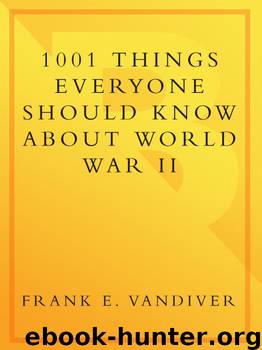1001 Things Everyone Should Know About WWII by Frank E. Vandiver

Author:Frank E. Vandiver [Vandiver, Frank E.]
Language: eng
Format: epub
ISBN: 978-0-307-48093-4
Publisher: Crown Publishing Group
Published: 2002-03-25T16:00:00+00:00
Sixth Army commander and newly created field marshal Friedrich Paulus, shortly after surrendering at Stalingrad, January 31, 1943.
508 Victory came at a crucial time for Russian morale; it soared as a new confidence energized the armies. Soviet losses in the Stalingrad campaign were never announced, but were doubtless heavier than German—skill in combat remained the Wehrmacht’s manifest advantage.
509 Although a real turning point had come in the war, it could hardly be seen at the time. Manstein fought frantically to hold the Rostov gateway open so Kleist’s Group A could escape the exposed Caucasus salient—Hitler had finally approved a withdrawal! But the withdrawal faced disaster as Hitler insisted that some toehold be held in the Taman-Novorossisk oil area. This could be done only by isolating the Seventeenth Army in a pocket with its right flank on the Black Sea and its left on the Sea of Azov. Almost a hundred miles of the Azov’s east coast gaped between Kleist’s Seventeenth and First Armies. Kleist successfully pulled his First Army back through Rostov just as a big Soviet attack on January 25, 1943, threatened to collapse Man-stein’s left and trap Group Don’s armies against the northern Azov coast.
510 For the Russians, 1942 ended with victories rolling forward from Leningrad (where close fighting shifted bits and pieces of the front and a slightly weakened blockade continued) and in front of Moscow (where the enemy had been pushed back toward Smolensk), and in the south where the Nazis were about to be expelled from the Caucasus.
After a brilliant beginning, 1942 proved an almost desperate year for Germany. Hitler’s aim south to the Crimean oil areas had beckoned drives to the Black Sea and on toward the Caspian Sea. But this possibility vanished when the Führer’s fascination with Stalingrad sucked men and equipment into a consuming maw that not only destroyed a huge German army but also threatened the loss of the initiative.
511 Still, skillful fighting by veterans had rescued the year for Hitler—a look at a map showed that, despite defeats, scares, and varied ineptitudes of Hitler himself, Nazi armies were about where they were when the year began.
Download
This site does not store any files on its server. We only index and link to content provided by other sites. Please contact the content providers to delete copyright contents if any and email us, we'll remove relevant links or contents immediately.
The Radium Girls by Kate Moore(12011)
100 Deadly Skills by Clint Emerson(4909)
Rise and Kill First by Ronen Bergman(4768)
The Templars by Dan Jones(4678)
The Doomsday Machine by Daniel Ellsberg(4479)
The Rape of Nanking by Iris Chang(4194)
Killing England by Bill O'Reilly(3989)
Stalin by Stephen Kotkin(3949)
Hitler in Los Angeles by Steven J. Ross(3937)
12 Strong by Doug Stanton(3541)
Hitler's Monsters by Eric Kurlander(3326)
Blood and Sand by Alex Von Tunzelmann(3186)
The Code Book by Simon Singh(3167)
Darkest Hour by Anthony McCarten(3116)
The Art of War Visualized by Jessica Hagy(2994)
Hitler's Flying Saucers: A Guide to German Flying Discs of the Second World War by Stevens Henry(2743)
Babylon's Ark by Lawrence Anthony(2666)
The Second World Wars by Victor Davis Hanson(2520)
Tobruk by Peter Fitzsimons(2499)
